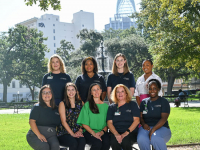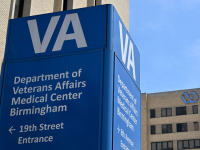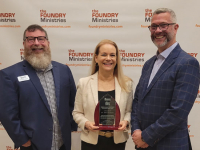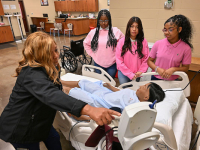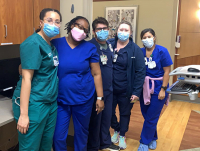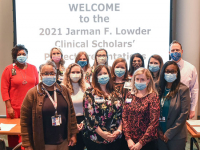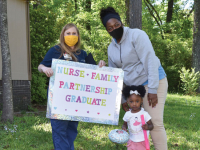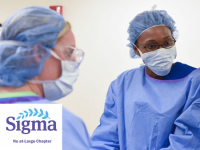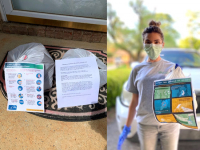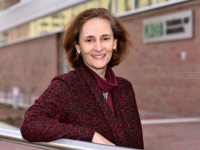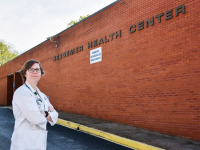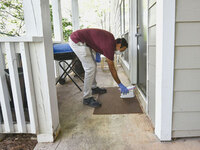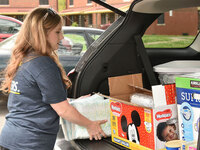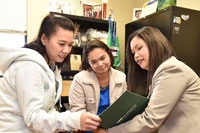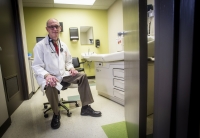 Dr. Ashley Hodges stands in the on-site clinic at The WellHouse. The clinic allows for easy access to consistent, trauma-informed care for the residents of The WellHouse.For a woman staying at The WellHouse, a nonprofit, faith-based organization that provides a safe residential environment to women who are survivors of human trafficking, trust is an important step toward healing. So is proper health care.
Dr. Ashley Hodges stands in the on-site clinic at The WellHouse. The clinic allows for easy access to consistent, trauma-informed care for the residents of The WellHouse.For a woman staying at The WellHouse, a nonprofit, faith-based organization that provides a safe residential environment to women who are survivors of human trafficking, trust is an important step toward healing. So is proper health care.
University of Alabama at Birmingham School of Nursing Associate Professor and Associate Dean for Graduate Clinical Programs Ashley Hodges, PhD, CRNP, WHNP-BC (MSN 1997, PhD 2008), works to attain both of those things through her faculty practice at The WellHouse.
“This clinic helps residents of The WellHouse address medical needs, but my visits also help them learn about self-care, including diet and exercise,” Hodges said. “The clinic empowers them to take care of themselves and to see how they can directly impact their own health.”
Hodges has a trauma-informed approach to care for the residents at The WellHouse, meaning she takes into account their background and past traumas, building trust with the women in order to provide proper health care. She is also a consistent care provider, which was not previously possible.
“We are in St. Clair County, and the majority of medical care that our residents require is in Jefferson County, in Birmingham specifically. When you have an average of 20 people needing to see a medical provider, the logistics of getting to that care are very difficult,” said Carolyn Potter, executive director of The WellHouse. “We just really needed something that was right there and accessible, and with the work of Dr. Hodges, this need is being met.”
The WellHouse hoped to provide on-site care for its residents, Potter said, and as a result of grant funding, they were able to construct a building and purchase medical equipment necessary to outfit an on-site clinic.
Hodges’ focus on women’s health and vulnerable populations, as well as trauma-informed care, made her an ideal fit for the clinic, said UAB School of Nursing Professor and Associate Dean for Clinical and Global Partnerships Cynthia Selleck, PhD, RN, FNP, FAAN.
“This is a wonderful opportunity for us to partner with an organization in the community, and we were able to find a faculty member that was an ideal fit for the clinic. Dr. Hodges is knowledgeable in trauma-informed care and providing care to women who are victims of sex trafficking. Her expertise is tremendously beneficial for this clinic,” Selleck said.
Trauma-informed care is important from the time a patient walks into the clinic to the time they leave, Hodges said, and it affects how a medical provider interviews, examines, does lab work and follows up with the patient. The main focus of trauma-informed care is avoiding re-traumatization in all aspects of a medical visit. Hodges is a part of the team at The WellHouse, and she helps build a feeling of safety and trust with the women on campus, Potter said.
“Before, there were people in the community who were very graciously giving their time and seeing these patients in their clinic, however, the patients had to see whoever was available, and it was not always a consistent provider. This clinic gives them a consistent, female provider right there at The WellHouse,” Hodges said. “This helps the women feel safe and in control of their care. They know we’re approaching their care as a team, with care that is based on their personal experiences.”
Debby Haralson, program and operations officer for The WellHouse, has already seen a difference among residents.
“I cannot overestimate the help that this clinic has brought,” Haralson said. “The wonderful thing is they are building relationships with Dr. Hodges, whereas before they wouldn’t see the same physician twice. The residents are confiding in Dr. Hodges, and she has been excellent at building a rapport with them.”
Residents receive a primary care assessment and gynecological exam when they first get to The WellHouse, Haralson said, but Hodges makes sure to take any discomfort with exams or clinicians into account.
 The WellHouse offers a residential environment for women who are survivors of human trafficking. The clinic Hodges operates is located within walking distance of the building where residents live (pictured).“These women have different levels of comfort and discomfort with the exams depending on the level of trauma they have experienced, and Dr. Hodges is very sensitive to that,” Haralson said. “Sometimes, someone has spent significant time in the hospital due to physical injuries, and they come in with a fear of a medical clinic, but I’ve seen Dr. Hodges slowly, quietly and deliberately build relationships.”
The WellHouse offers a residential environment for women who are survivors of human trafficking. The clinic Hodges operates is located within walking distance of the building where residents live (pictured).“These women have different levels of comfort and discomfort with the exams depending on the level of trauma they have experienced, and Dr. Hodges is very sensitive to that,” Haralson said. “Sometimes, someone has spent significant time in the hospital due to physical injuries, and they come in with a fear of a medical clinic, but I’ve seen Dr. Hodges slowly, quietly and deliberately build relationships.”
“They form a relationship with me, which means they feel more comfortable expressing things to me that they might not express in a one-time short visit,” Hodges said. “They can also see me as frequently as necessary, and that wouldn’t be possible in another clinic.”
Since starting to see patients in January 2018, care provided in the clinic has expanded. Hodges recognizes trends in the health of residents and plans are underway to hold group education sessions to expand what is already being done to address self-care topics such as diet, exercise and other topics, which Potter said are necessary for the women’s overall health.
“It all goes into the team effort of providing these women with the basic necessities of life,” Potter said. “Oftentimes, their abuse started in childhood, and their need to survive abuse is what has guided their life, and they might not have been taught the basics of life. What Dr. Hodges and our staff do is they teach everything from cooking meals, taking care of their bodies and exercising. They’re having to learn all of these things as adults who have survived.”
Through partnerships at UAB, the women are also able to receive dental and optometric exams, as well as other health care. They also have physical trainers who come in to teach good exercise habits.
“People are willing to contribute their time and efforts for these women, and in the future, I hope we can expand our partnerships and expand these offered services,” Hodges said.
“Hope and healing can happen at any time in life, and there is hope and healing for these women at The WellHouse,” Haralson said. “The answer to their needs is the integration between physical, emotional and relational health. It’s important to be in a community, and there’s a lot that the UAB community can do to foster that health.”
